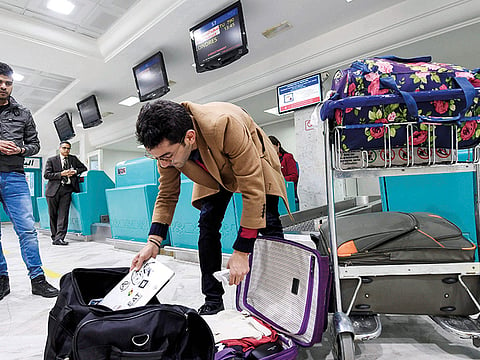IATA says electronics ban ‘unacceptable long-term solution’
IATA urges governments to find another way to keep flying secure

Dubai: The head of the International Air Transport Association (IATA), a trade group of the world’s airlines, said measures by the US and UK to ban large electronic devices on certain flights were “not an acceptable long-term solution”.
In a speech, Alexandre de Juniac, IATA’s director general and chief executive officer, urged governments to work with the aviation industry “to find a way to keep flying secure without separating passengers from their personal electronics.”
“The current measures are not an acceptable long-term solution to whatever threat they are trying to mitigate. Even in the short term, it is difficult to understand their effectiveness. And the commercial distortions they create are severe,” de Juniac said.
The CEO, in his speech to the Montreal Council on Foreign Relations, highlighted the need to maintain the public’s confidence in the security of the aviation industry, which globally operates an average of 100,000 flights a day.
“With the measures now in place, our passengers and member airlines are asking valid questions. Why don’t the US and the UK have a common list of airports? Surely, there must be a way to screen electronic equipment effectively. The current situation is not acceptable and will not maintain the all-important confidence of the industry or of travellers. We must find a better way. And governments must act quickly,” de Juniac said.
Direct flights
On March 21, the US announced it will introduce a ban that prohibits aircraft passengers from having carry-on electronic devices larger than a mobile phone.
The ban covers direct flights from airports in Dubai, Abu Dhabi, Doha, Cairo, Istanbul, Kuwait City, Jeddah, Riyadh, Amman, and Casablanca. Its implementation started on March 25.
Less than a day after the US move, the UK followed suit in introducing a similar electronics ban, though the list of airports covered in the ban varied slightly from the US’. The UK’s ban did not include any airports in the UAE, Kuwait, and Morocco, but covered those in Tunisia and Lebanon, leaving analysts scratching their heads on how the airports were selected.
Muhammad Albakri, IATA’s regional vice president for Africa & Middle East, said the “commercial distortion” the ban creates for airlines will also impact the region’s carriers.
“We wouldn’t be able to speculate on the direct commercial impact, yet we believe that the airlines affected will suffer a commercial distortion. However, we calculate that the ban will impact about 393 scheduled passenger flights to the UK from airports affected,” he told Gulf News.
He added, “In terms of flights to the US, we calculate that the ban will impact about 350 scheduled flights a week, equivalent to about 2 per cent of total international flights from affected airports to the US.”
Frustration
Al Bakri said that IATA has been supporting regional “airports and airlines that have requested our assistance” regarding the ban implementation. He did not specify which companies and operators asked for support.
IATA also expressed frustration at the process used by governments to implement the bans.
“The industry came together quickly to implement the new requirements. That was a challenge because there was no prior consultation and little coordination by governments,” de Juniac said.
But it wasn’t just IATA taking issue with the ban.
The International Civil Aviation Organisation stressed that there needs to be a balance when it comes to security risks, because incidents involving devices with lithium batteries may be more easily mitigated in the cabin than in checked baggage.
“Of course the safety of passengers in paramount, but there must concerns about exchanging one risk with another,” said industry analyst Alan Peaford.



